- Home
- Fiona Quinn
Relic (Uncommon Enemies: An Iniquus Romantic Suspense Mystery Thriller Book 2) Page 2
Relic (Uncommon Enemies: An Iniquus Romantic Suspense Mystery Thriller Book 2) Read online
Page 2
“Yes, thank you.” As Sophia sprayed her thighs, she realized that this was truly the stuff of nightmares. While she’d tried to survive against the power of an evil universe last night, she could just as easily have had this surreal dream, standing half-dressed in a parking lot, handing the spray can to a stranger so he could get the back of her legs. Thank goodness there was nothing pervy or seedy about this guy. In her mind, she decided he was a first responder of some kind, and he was out of uniform but still felt compelled to help. She reached down and gingerly yanked her pants into place.
The stranger handed her the can. “I bet you’ll need a touchup before the day is through.”
She took it gratefully, wondering what the right thing to say in a situation like this was. “You’ve earned yourself a boxful of good karma.” She extended her hand to shake his.
“Perfect. I was running kind of low on it.” He grinned and loped off, as if seeing a woman disrobe in a parking lot was an everyday occurrence.
Sophia reached for the blankie scrunched in Turner’s car seat to use as a barrier between the puddle in the driver’s seat and her pants. She put her car in gear and pressed on the gas. Chancing a ticket with her aggressive driving, she fought through traffic to get to Iniquus. She needed to get there on time, looking crisp, cool, and professional. After all, first impressions were impossible to unwind.
Chapter Three
Sophia
Monday a.m.
Titus Kane, Panther Force Commander, scowled at the men who had assembled in the meeting room. Sophia and Nadia sat off to the side outside his direct view. Sophia found him thoroughly intimidating. His uniform of gray camouflage battle fatigues, and a compression shirt that showed off every bulge and ripple of his muscles, plus the sheer size of him—he felt lethal. Since he oversaw their security team, that should be comforting, Sophia reminded herself. But it wasn’t. There was something about this man, beyond his scowl and authoritative tone, that made Sophia feel like he was a hunter, and she might be his next meal. This man was not her friend or protector. She knew on a cellular level, from the moment he had scanned her with assessing scrutiny, that she was somehow in danger.
As Commander Kane looked over a note someone had handed him, his men sat at attention. Kane obviously garnered their utmost respect. Sophia’s mind scrambled down various pathways to find a reason why her alarm bells were clanging. The only thing she could settle on was that the Lidocaine had worn off and her thighs were screaming.
“Gentlemen.” Titus stalked to the front of Panther Force war room—that was the name stenciled on the door. It seemed an appropriate title, after all, her job was a kind of war and these were the soldiers who were supposed to help her in her fight. “Panther Force has been assigned a new case. We are tasked with security concerns for The Ancient Artifact and Cultural Preservation Society, or AACP, an International organization with the mandate to discover and protect the world’s treasures.” He paused as his team scribbled the name onto their notes. “Our assignment will be to develop security teams at various global archaeological sites where the relics are most at risk of being destroyed or plundered.” He fisted his hands and planted his knuckles on the table, leaning his weight forward, sweeping his gaze over his teammates, stopping short to exclude Nadia and Sophia. “To that end, in the host countries, we will be using local assets whom we vet and train,” he said. “Iniquus will directly provide security for the American scientists who are involved as they travel to the remote areas. While we’ll have Iniquus operatives available to fill our ranks on the personal security teams, it will be Panther Force who takes the lead. It’s a very interesting case, as you will soon learn.” Now he stood and stared straight at the two women.
Nadia reached under the table and squeezed Sophia’s thigh. Sophia winced with pain and lifted her friend’s hand and rubbed it softly, hoping to give them both a little courage as they wilted under the commander’s glare.
“To that end, may I present Dr. Nadia Dajani and Dr. Sophia Abadi, who are here representing their employers to give us a better understanding of what they do and how we can best support their work.”
Releasing Nadia’s hand, Sophia put on the guise of an Egyptian queen here to explain the state of affairs to her loyal subjects. It was a ploy she’d used at the university to make it through her presentations. Sophia refused to look in Commander Kane’s direction as she moved regally to the front of the room.
“Thank you.” Sophia picked up the remote that would start the PowerPoint presentation. She looked to her right. “Could we dim the lights, please?”
An operative in the front row rose and moved toward the wall, exposing his teammate who had been hidden from her original sweep of the room’s occupants. Sophia found herself eye to eye with Brian Ackerman. Sophia had thought Brian was a distant memory, someone she’d never see again. He looked back at her with an inscrutable gaze that had Sophia taking a quick step sideways to rebalance herself. Caught off guard, she let her long black hair fall across her face, hiding behind the thick waves as she worked to manage her emotions. She spun back toward the screen. Today was turning out to be a Monday on steroids. She wondered if the universe was pranking her like her neighbors. She didn’t find any of this funny.
It’s a freaking small world, Sophia thought, brushing her hair out of her eyes, knowing that she already looked like she’d just tumbled out of bed. She reached for a water bottle and swirled a mouthful of cool wetness around her mouth while she checked to make sure the first image was correct. Her heart was beating way too fast. She had already been suffering from an extra helping of anxiety. And now, here was Brian.
She glanced quickly over his way to see if he’d caught her nervous reaction. He had leaned back in his chair and crossed his arms over his chest without the smallest glimmer of discomfort. Or recognition for that matter. Huh. Maybe she was mistaken. He could be a doppelganger. Or maybe she’d been staring at computer screens so long that she needed glasses. Sophia forced herself to believe that. Mind games were a powerful tool she used to get through life’s challenges. She compelled herself to smile at the room of men with their soldier-like demeanors.
“Gentlemen,” she began, steeling herself as she drew their attention. She knew this was the hardest part. Once she got talking about her work, her stress would ease. She loved her job and loved that she made a difference to human history. “We’ll be working closely together, so please feel free to call me Sophia and my partner Nadia.” Sophia’s ribs felt tightly corseted, preventing her from taking in enough air. It made her already husky voice sound deeper. Breathless. Sultry. And oh, so out of place in this meeting room full of alpha males. She was glad that the darkened room would help hide her blush. “Our PhD titles sound pretentious, but really what we do for a living is play in the dirt and find wonderful things.” She pressed the button to show a picture of her and Nadia at a dig site, covered with filth and sweat, shielding their faces as a camel spat on them.
Low chuckles rumbled across the room
“Not glamorous, but certainly very interesting.”
By the men’s smiling responses and relaxing body postures, Sophia knew the self-deprecating photo did the trick. It plucked them out of their ivory tower and made them accessible. She and Nadia had agreed that this would be the best tactic. They wanted to be among peers—avoiding the sterile relationship they both felt led to the death of their colleague in Iraq when his security team had to prioritize who and what they could save. He hadn’t been at the top of the list.
Sophia switched to a picture of an astronaut floating in space, which threw her body squarely back into this morning’s nightmare. Fear itched over her scalp, but Sophia drew her smile a little wider, a little brighter. “Actually, Nadia and I are Space Archaeologists.”
“Has anyone heard about this?” Nadia asked and scanned for affirmation. Getting none, she said, “It’s a fairly new area of research. It used to be that a space archaeologist did research-based studies
of items made by humans that are now floating around in space. They document those items as part of our human cultural heritage. But in the case of Sophia and I, we use satellite imagery to find possible dig sites of ancient cultures. We also use the data to protect locations we are already aware of. We can see looting happening almost in real time. We sit in front of computers each day here in Northern Virginia doing our research in the comfort of our climate-controlled office, instead of digging in the Middle Eastern sand under one-hundred-thirty-degree heat.” She nodded at Sophia to continue.
Sophia changed the picture to one from Giza, the Sphinx haloed by a full moon in a velvet-blue sky. “Our first discovery was a pyramid buried under a modern Egyptian city that, over time, was built on top of it.” She pressed the button to reveal a lush mountainside. “As well as hidden caves in Slovakia where art from World War II had been hidden by the Nazis. Those finds let us know that we had a formidable tool to protect world antiquities. Right now, because of the global temperature changes, we are at an acute risk of losing many of our yet undiscovered cultural sites to rising sea waters, at the same time as other sites are emerging from beneath the glaciers. There is a sense of immediacy in our need to discover and plot the locations of our shared human heritage.”
Sophia switched the picture to a nighttime satellite image of a city, and Nadia gestured toward the screen with widespread arms. Dressed in her geometrically cut fuchsia suit, her long black hair softly curled and draping over her shoulder, Nadia could easily have fit into any Fortune 500 corporate boardroom. All eyes were fixed on her when she moved to the center of the room. Sophia knew her friend was as phobic about public speaking as she was, and while Sophia appreciated any little break from the attention, she wished at least one of them could do this with ease.
“Our world is in crisis,” Nadia said. “We believe that our shared human history can help hold us together. It is in humanity’s best interest that we do our work at AACP. Thanks to the amazing contributions of corporations and wealthy individuals who agree with that premise, we are now making satellite-related finds a global effort.” Nadia sounded like a late-night infomercial. She was rigid, and her words came out as too formal and overly rehearsed. “AACP is about to launch a worldwide initiative to give everyone an opportunity to become space archaeologists.” Nadia stopped to smile as if it were written into the script. Then she focused on the back wall over the men’s heads. “Imagine, if you will, that this is Google Earth with exponentially more capability. Our teams will process satellite imagery, then we’ll upload them to a platform to allow laypeople to help us search.”
“I’m Gage,” the man sitting in front of Sophia said, leaning forward and pointing at the screen with his pen. “That seems like a very technical process, how is it possible for a layperson, an armchair archaeologist, to do this kind of search?”
Nadia took a step in his direction, obviously glad to be more conversational. “The plan is to give someone a small area to search—only say, twenty meters squared.” She turned. “Sophia, can you find an example?”
Sophia flipped through the images until she found what she needed.
Nadia turned to point. “They’ll be given the original image as well as an enhanced image to look at. In comparing the two examples, the patterns should pop out better, so that one can see in photo B what wasn’t clear in photo A. There will be keys that will help the amateur hone in on what’s important. The volunteers can tag the photos with notes on what they think they’re seeing. We need fresh eyes on those images. Space archaeologists suffer from eye fatigue from looking through all this data all day. And to be honest, we simply don’t have time to search for new sites when we’re so involved in saving the ones that we’ve already identified.”
Sophia clicked the button to show a picture of bombed out Aleppo.
“I’m sorry,” Nutsbe said. “Before you move on, it seems to me that the GIS—Global Information System—data is extremely sensitive. If you’re crowdsourcing the effort, doesn’t it concern you that this might be used by professional treasure hunters? Or others with less altruistic designs?”
Sophia thought the question a good one, astute. It was one of the dangers that had been discussed ad nauseam in their planning meetings. “It’s a possibility, but a remote one. The plots that we put up won’t have GPS information attached, and our software engineers are working to mask location-defining information. No one should be able to tell where on the globe their plot is located.”
Sophia flipped forward in the images to give Nadia an example. “This site is in Peru,” Sophia explained. “That’s our upcoming trip that Panther Force will be involved with. This site was discovered by a project beta tester. While we’re planning an exploration of the area, that person has no idea where it is or what we’re doing with the information they provided us.” She glanced around to see if there were any more questions. “We’re giving you the information on how we’re progressing with our site searches as background, but that’s not Nadia’s forte, nor mine. Our backgrounds are in the antiquities of the Middle East and our focus is almost solely on Syria.”
The image changed to a beautiful mosaic that had recently been unearthed. Sophia stopped and looked at it for a moment. She turned to the men, hoping that they could appreciate the enormity of its significance. The John the Baptist, Roman piece had survived beneath the dirt in pristine condition for over a millennium. “Perhaps you have read, or know through your work, that ISIS is one of the most devastating forces destroying cultural heritage since the Nazis in WWII.” Sophia knew these men were being paid to do a job, but from her experience talking to colleagues from all over the world, getting these operatives invested in their project was key to successfully saving the art and maybe even themselves. Sophia hoped she and Nadia had picked the right route to hook their interest and get them invested in AACP’s agenda.
“Syria is the seat of human history—of writing and record keeping, of science and math. ISIS is systematically destroying their ancient architecture.” Sophia gestured toward the image. “Artifacts, such as this one from around fifteen hundred years before the Common Era, are at risk. When the pieces aren’t being destroyed, they’re being sold on the black market. The sales of these antiquities are a major funding source for ISIS. You already know that ISIS is one of the best financed terrorist organizations in the world.” Sophia let her focus move around the room, resting briefly on each man. She wanted to make this point clear. This was not some tutti frutti do-gooder campaign. “Protecting artifacts in Syria cuts off a main ISIS revenue stream and helps to destroy ISIS’s ability to proliferate. This is a matter of national security. We are in the forefront of the fight against terror.”
Sophia got what she was looking for, the men had a new alertness about them. They had been polite during the beginning of the presentation—maybe even a little bit curious and interested. But now the mood had shifted.
She and Nadia had been passionate about stopping terror since they went on an ill-fated dig years ago, the very last dig they went on with their fathers. Sophia’s thoughts drifted back to the night they’d had to run to the US embassy for help. She caught herself before a full-blown PTSD flashback took hold. She pulled herself back to the present in time to hear Nadia explain, “There are over ten-thousand Mesopotamian tells in the war zone. A ‘tell’ is a hill that was created over time as people built and rebuilt on the same site. Tells are filled with important information about how people lived their lives in the past. They are also filled with artifacts that have value on the black market. That black market funds ISIS.
“Right now, there are six sites in Syria that have been designated as UNESCO World Heritage Sites. These include places like Ancient Damascus, Palmyra, Bosra, and Aleppo. Sites that are in the news every day as they’re being bombed and destroyed. There are twelve more sites that UNESCO will consider designating in the future, but that largely depends on what can be done right now to save them from pillage and destruction. ISI
S hates everything that existed before the Prophet Muhammad. They have already reduced the Arch of Triumph in Palmyra to a pile of rubble. UNESCO labeled it a war crime. Stopping this destruction is another important component in fighting ISIS.”
Sophia changed the picture to one of cheering ISIS soldiers. “You see, ISIS is publishing photos like this one to show their disdain for international authority. Their methods are consistent. First, ISIS attacks the people, women and children, the elderly…men and even boys are forced into their fighting ranks or they face the firing squad. Second, they systematically attack heritage sites both for ideological and propaganda gains. And third, they sell the artifacts using crime families to move the goods from finder to buyer quickly and easily. It is our job,” Sophia said, “to document endangered sites in Syria. Nadia and I are connected with Syrian groups who, amid the bombing, are working every day to detail and protect the antiquities.”
“Sophia is focused on using GIS to track the looters and to pinpoint possible areas where we could get the good guys on scene before ISIS finds the relics. I’m working to catalogue the items that we know about, so we can prevent people from selling them on the black market, or prove the items are stolen if investigators find them in private collections. Bottom line, our goal is to stop the looting, which in turn helps to stop terrorism,” Nadia said.
Titus had been standing at the side of the room with his shoulder pressed into the wall. His being out of her direct line of sight had allowed Sophia to put him out of mind. But now he was asking her a question, and she was having a hard time focusing on his words; she was so affected by his scowl. “Tell me more about the propaganda factor.”
After a long moment of standing mute and wide-eyed, Nadia came to her rescue, reaching out to take the remote from Sophia’s hand.

 The Lynx Series Boxed Set II: Books 4-6 (Iniquus Security Action Adventure Boxed Set Book 3)
The Lynx Series Boxed Set II: Books 4-6 (Iniquus Security Action Adventure Boxed Set Book 3) Cold Red
Cold Red Hyper Lynx (The Lynx Series Book 6)
Hyper Lynx (The Lynx Series Book 6) Gulf Lynx
Gulf Lynx Danger Signs (Delta Force Echo: An Iniquus Action Adventure Romance Book 1)
Danger Signs (Delta Force Echo: An Iniquus Action Adventure Romance Book 1) Danger Zone (Delta Force Echo: An Iniquus Action Adventure Romance Book 2)
Danger Zone (Delta Force Echo: An Iniquus Action Adventure Romance Book 2) In Too Deep_An Iniquus Romantic Suspense Mystery Thriller
In Too Deep_An Iniquus Romantic Suspense Mystery Thriller Open Secret
Open Secret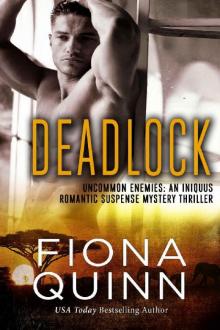 Deadlock (Uncommon Enemies: An Iniquus Romantic Suspense Mystery Thriller Book 3)
Deadlock (Uncommon Enemies: An Iniquus Romantic Suspense Mystery Thriller Book 3) Cuff Lynx
Cuff Lynx Instigator (Strike Force: An Iniquus Romantic Suspense Mystery Thriller Book 3)
Instigator (Strike Force: An Iniquus Romantic Suspense Mystery Thriller Book 3)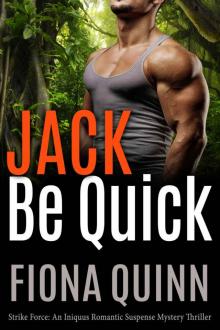 Jack Be Quick
Jack Be Quick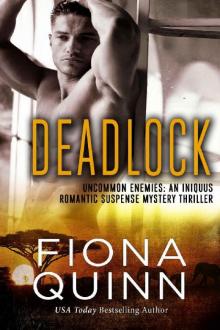 Deadlock_An Iniquus Romantic Suspense Mystery Thriller
Deadlock_An Iniquus Romantic Suspense Mystery Thriller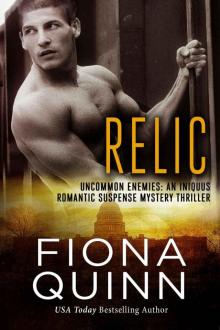 Relic_An Iniquus Romantic Suspense Mystery Thriller
Relic_An Iniquus Romantic Suspense Mystery Thriller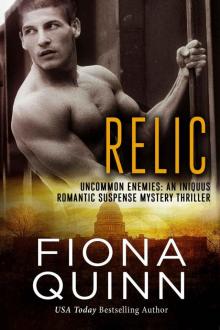 Relic (Uncommon Enemies: An Iniquus Romantic Suspense Mystery Thriller Book 2)
Relic (Uncommon Enemies: An Iniquus Romantic Suspense Mystery Thriller Book 2) Weakest Lynx
Weakest Lynx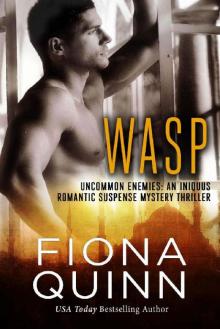 Wasp (Uncommon Enemies: An Iniquus Romantic Suspense Mystery Thriller Book 1)
Wasp (Uncommon Enemies: An Iniquus Romantic Suspense Mystery Thriller Book 1)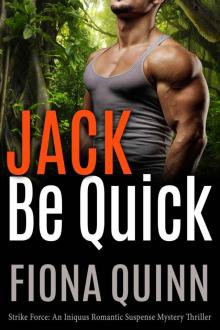 Jack Be Quick (Strike Force: An Iniquus Romantic Suspense Mystery Thriller Book 2)
Jack Be Quick (Strike Force: An Iniquus Romantic Suspense Mystery Thriller Book 2)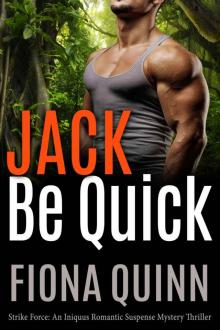 Jack Be Quick_An Iniquus Romantic Suspense Mystery Thriller
Jack Be Quick_An Iniquus Romantic Suspense Mystery Thriller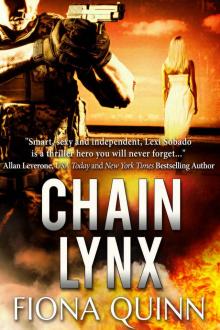 Chain Lynx (The Lynx Series Book 3)
Chain Lynx (The Lynx Series Book 3) In Too Deep (Strike Force: An Iniquus Romantic Suspense Mystery Thriller Book 1)
In Too Deep (Strike Force: An Iniquus Romantic Suspense Mystery Thriller Book 1)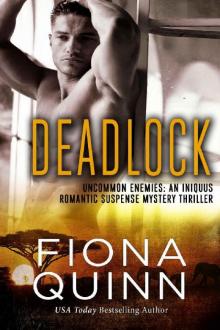 Deadlock
Deadlock Instigator_An Iniquus Romantic Suspense Mystery Thriller
Instigator_An Iniquus Romantic Suspense Mystery Thriller Instigator
Instigator